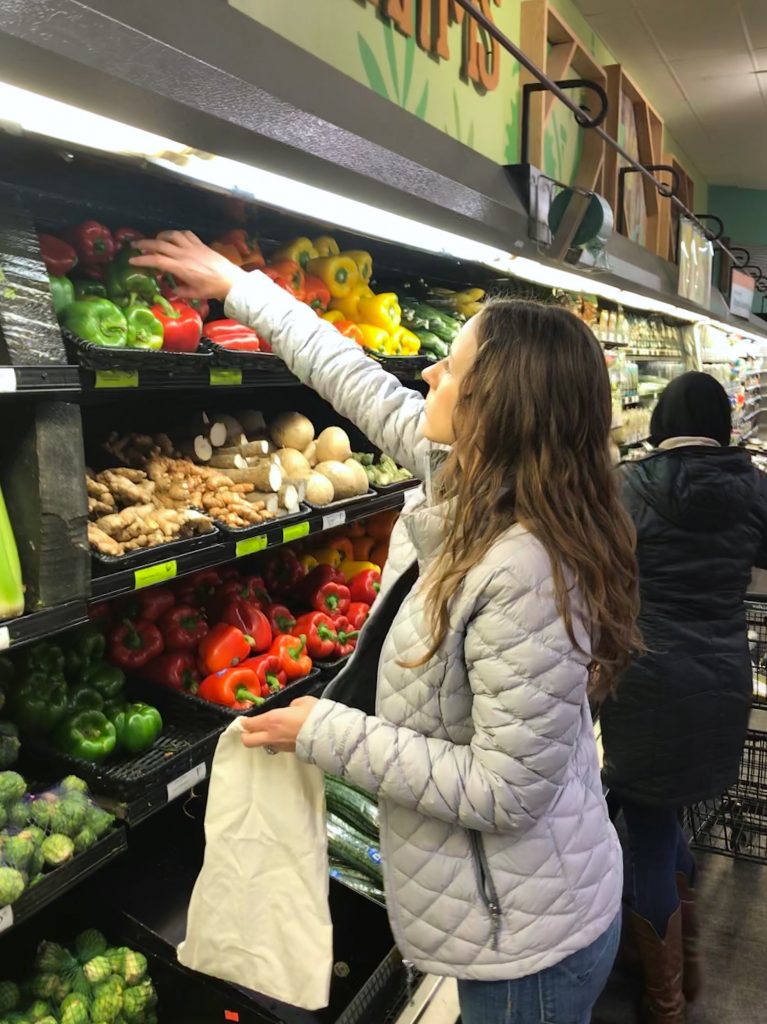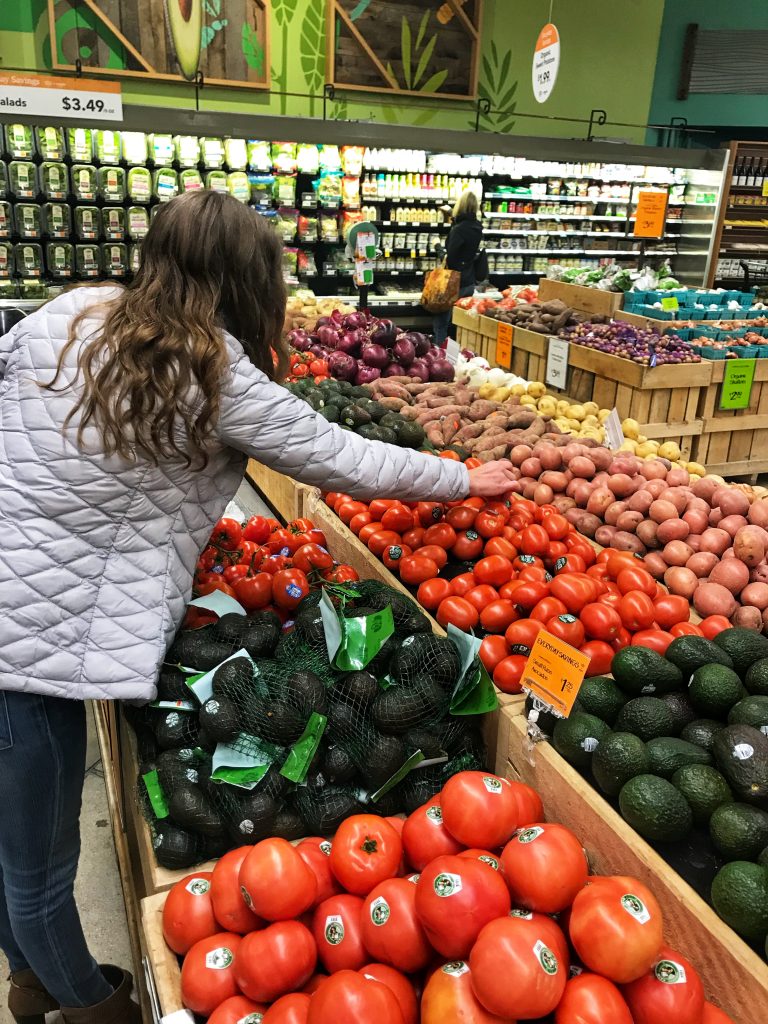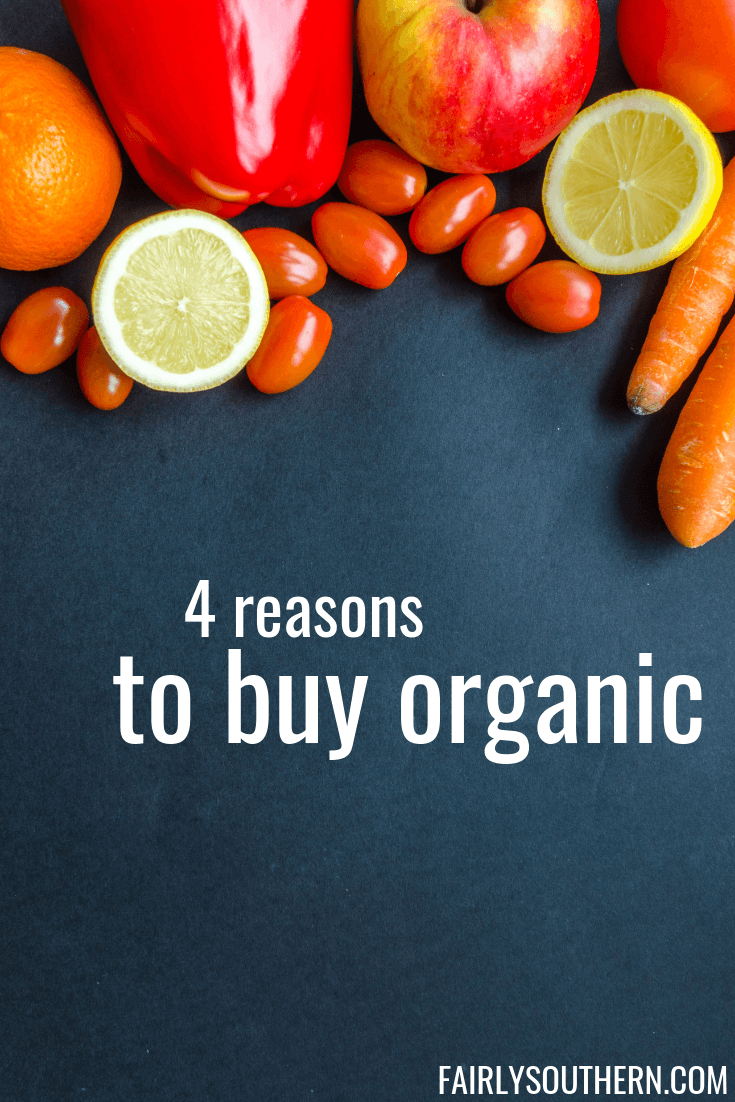This post is part of my Why Series here on the blog. I often write about fair trade, eco-friendly, socially conscious living, but I am not always able to fully address in each of my blog posts WHY I choose to live this way. This series goes into greater detail about my why!
Organic vegetables, organic clothing, organic baby formula, organic toys…the label “organic” seems to be everywhere these days. The merit of organic products is a hotly debated topic, especially since buying organic tends to come with a higher price tag. Today, I’m explaining what “organic” means and sharing why I personally choose to shop for organic products when possible.
What is Organic?
Generally speaking, a plant/animal product is considered “organic” if it was produced without the use of pesticides, growth hormones, genetic modification, and other unnatural processes or substances. Products that may be produced organically include fruits, vegetables, grains, meat, dairy products, and crops such as cotton that are used to make clothing, linens, and other household items.
The official USDA organic label is applied to products that have been certified as meeting certain organic standards. In order for a product to be classified as organic, “the use of most synthetic pesticides and fertilizers, growth hormones, sewage sludge, irradiation, and genetic engineering (genetically modified organisms or GMOs) are prohibited.” You can read about the full set of standards here.
The USDA organic certification isn’t a guarantee that labelled products are completely free of unnatural substances. For example, certified organic farmers are allowed to use black and white newspaper as a mulch for organic crops. Newspaper certainly isn’t a natural substance, and some newspaper inks still contain dangerous compounds called VOCs. Still, newspapers are recycled, and most of them utilize non-harmful soy or water based inks, making them seem pretty harmless when compared to cancer-causing chemicals in pesticides and herbicides (we’ll get to that in a minute). So, while the organic label may not indicate a perfectly natural product, it does indicate a product that is far more natural and safe than conventional ones. It’s a good start!
Personally, I am less concerned about whether a product has an official organic certification and more concerned with the actual practices surrounding the production of that product. A company may utilize organic methods yet not have the official USDA organic certification, which requires time and money to obtain. In my mind, these products are just as good as products that do have the certification! The nice thing about the certification is that it is an easy way to tell whether a product was produced organically without having to do any actual research yourself, since all you have to do is look for the official USDA organic seal on the product packaging.

Why I Buy Organic
I have chosen to purchase organic products whenever possible for the following reasons:
1. It’s Better for Me
Common sense alone tells us that pesticides and herbicides probably aren’t good for us. If they kill plants and other animals, it seems there is probably a pretty good chance they could be harmful to us, too. And research shows this is likely true.
Take for example the common herbicide glyphosate, which is the main ingredient in Roundup. Glyphosate has been declared a “probable carcinogen” by the World Health Organization and is implicated in digestive issues such as Celiac disease.
Pesticides are also linked to birth defects, developmental disorders, diabetes, and a wide range of neurological symptoms and disorders, including Parkinson’s disease and Alzheimer’s disease.
After learning about all of the possible negative health effects of these chemicals, it is obvious to me that my body is better off without them.
2. It’s Better for the Earth
Pesticides aren’t good for the environment, either. When pesticides and herbicides are sprayed, much of the spray naturally falls on the ground, contaminating the soil. These chemicals degrade the quality of the soil, which impacts future food production. And when rain falls, it washes chemical residue into our water supply. These chemicals then spread throughout our ecosystem. Organic production practices prevent the contamination of our planet.
3. It’s Better for Animals
When dangerous chemicals spread through our soil and water sources, they begin to impact wildlife. Pesticides and herbicides can be toxic to beneficial insects, fish, birds, and non-targeted plants. Indeed, pesticides that caused eggshell thinning are believed to be the reason for the near extinction of the bald eagle in the United States. Pesticides have also caused declines in pollinator populations (i.e. bees), which are crucial in assisting with plant reproduction and, ultimately, sustaining our food supply.
Organic farming is also better for agricultural livestock. A common non-organic dairy farming practice is to inject dairy cows with rBGH, a lab-created growth hormone. This hormone increases milk production but also causes adverse health effects for cows, including mastitis and foot problems. No thanks! I love cheese, but I don’t want animals to suffer in order for me to enjoy it. Purchasing organic dairy and meat products ensures more humane treatment.
4. It’s Better for Other People
Obviously, if pesticides aren’t good for me personally, they’re also not good for other people. If I truly care about the health of others, why would I encourage with my dollars the use of chemicals that will contaminate the food and water supplies of others?
Pesticides especially negatively impact farmers and other agricultural workers who are growing our food and other raw materials. They come into contact with higher concentrations of pesticides and herbicides since they are the ones spraying and working around the sprayed produce/soil.
A meta-analysis of research on herbicides, pesticides, and other agricultural chemicals showed that occupational exposure to these substances was linked to an increased incidence of non-Hodgkin lymphoma. Studies also show an increased risk of neurological problems in farmers exposed to pesticides.
I wouldn’t want to be a farmer exposed to these substances. I wouldn’t want any of my friends or relatives to be farmers exposed to these substances. If I am serious about caring for others and recognizing all lives as equally valuable, I have to say no to pesticides out of respect for hard-working farmers who do not deserve to be disease-ridden due to these dangerous chemicals.

Organic is Worth It
Organic carrots, organic bed sheets, and organic toothpaste can’t guarantee me good health and aren’t the only things that are going to save our environment. But to me, they are a major piece in the puzzle. Spending a little bit extra on organic goods seems reasonable to me given how detrimental things like pesticides and other toxic chemicals can be for my own health, the environment, animals, and other people. The dollars I choose to spend on organic goods cast a vote for my values and the type of world I hope to live in.
Did you learn something new from this blog post? Do you have another reason for why you personally choose to purchase organic? Let me know in the comments!
xoxo Laura

Very well put.
I always try to shop organic when I can. I have noticed that the cost of organic produced has slightly decreased as time has gone on. Hopefully that trend continues.
While GMO products have greatly helped with production and feeding the growing population, there is still the greater issue of food waste. A ton of fruits and vegetables get thrown out because they don’t meet a a certain ‘beauty’ standard the grocery stores demand. Maybe if the standard was removed, it would relieve the need for so much GMO produce.
Great article!
Thank you for bringing up the issue of food waste due to produce beauty standards! I have seen more companies popping up lately that sell “imperfect” produce at reduced prices, which seems to help prevent food waste while also offering a more affordable produce option. I hope that models like this that encourage us to use “ugly” produce will continue to gain traction!